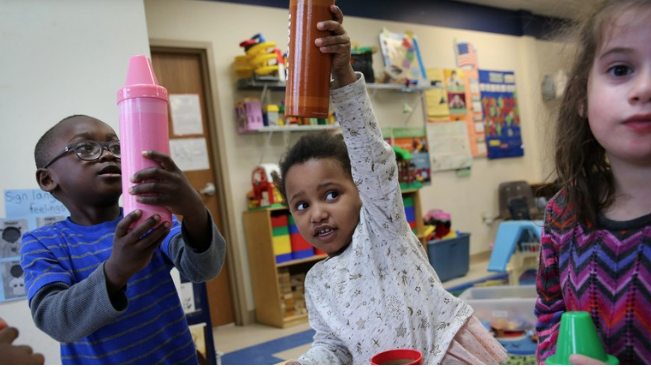CommentsCHILD CARE – LaToya Brown-Clayton is struggling financially as the owner and operator of Connecting the Pieces, a family child care program in Hartford, Connecticut.
Ms. Brown cares for children from infancy until they enter kindergarten, offering after-school care once they are older. Families from across the city flock to her, but still, she can barely pay the bills. She’s even considered driving for Door Dash to make ends meet.
Further south, in West Haven, Bernadette Ngoh has kept her program, Trusted Care, open around the clock for the children of health care workers and others on second and third shifts. Some of her families couldn’t pay when they were sick during the pandemic, so Ms. Ngoh held their childrens’ spots open at no cost. She, too, is barely scraping by.
On March 15, over a thousand child care providers, advocates and parents across Connecticut took to the streets to demand more funding for child care. Their message was clear: child care educators can’t keep going without fair pay. Most of these educators are women. Many are Black and brown women. Their labor is helping to keep our economy afloat, but they only earn roughly $25,000 per year.
It's time to make history by investing in child care.
Family child care educators–those who run small child care programs in their homes–play an especially important role in providing care to infants and toddlers. Yet they are operating on razor-thin margins, and usually pay themselves last, if at all. And it is these exact educators who are crucial to ensuring women’s ability to participate, and ultimately thrive, in the workforce.
Lack of access to child care is one of the primary reasons women are unable to work. Even before the pandemic, families faced challenges finding child care. The current crisis, which has been greatly exacerbated by COVID-19, has forced many women to leave the workforce in order to take care of their children, and the situation is only worsening as time goes on. Since the pandemic began, nearly 16,000 child care programs have closed, and staffing shortages are severely limiting the supply of care. Women on both sides of the child care system–those seeking care, and those providing it—are hurting.
Women accounted for the majority of job losses during the pandemic. Their participation in the workforce is the lowest it has been in three decades, and it has been slower to recover than other demographics. Losses such as these impact women’s financial security in both the short term, as families struggle to cover household costs. It hurts in the long term as well, as women miss out on promotions, raises, and the opportunity to build wealth, costing them hundreds of thousands of dollars over their lifetimes. Once they re-enter the workforce, women face other challenges as well; in a recent brief, the Institute for Women's Policy Research reports that at least one in three working women lack access to a critical benefit, such as health insurance, paid leave, or job security.
In order to address this crisis, we urgently need action. States can provide stabilization grants directly to programs to help educators weather the economic hardships that they have experienced during COVID, and help them pay higher wages to retain their staff. States can expand access to subsidies that help families pay for child care.
States can also provide training and technical assistance – like that provided by All Our Kin – which has been proven to have a significant impact on family child care educators' earnings. All Our Kin offers licensing support, specialized family child care business training, and professional learning opportunities for family child care educators. Many educators' earnings increase by $5,000 after their first year of receiving this support; four or five parents go to work for every family childcare business that opens; and every dollar invested yields $15 to $20 in regional economic returns.
But help is needed beyond the state level. The federal government must also do their part to support these educators. President Biden called for an investment in childcare in the State of the Union, but funding is stalled in the Senate. Across the country, parents, educators, and policymakers are looking to federal lawmakers to provide much needed dollars. With these funds, states can take decisive action to stabilize care.
It’s time to make history by investing in childcare. When we invest in childcare, we invest in the workforce as a whole, making it possible for parents, especially women, to go to work. We speed the nation’s economic recovery. And we create the conditions for fair pay, for both parents and providers.
(C. Nicole Mason is CEO of the Institute for Women's Policy Research and Chair of the Board for All Our Kin and a writer for Common Dreams where this was featured.)






